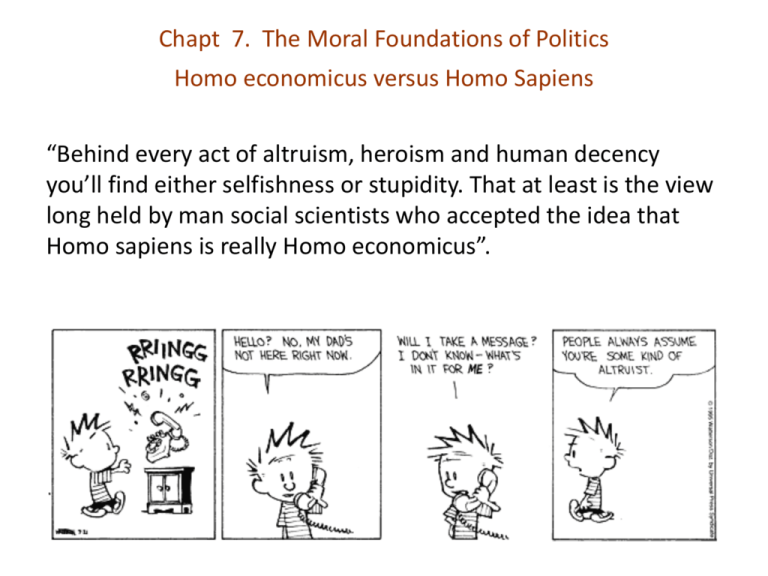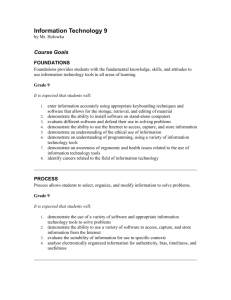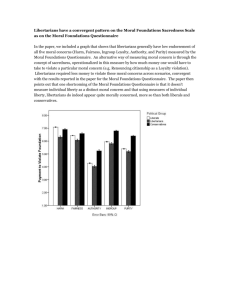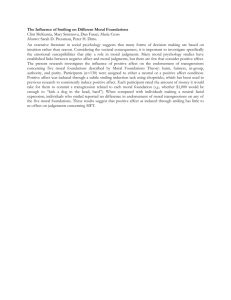EP Haidt 7
advertisement

Chapt 7. The Moral Foundations of Politics Homo economicus versus Homo Sapiens “Behind every act of altruism, heroism and human decency you’ll find either selfishness or stupidity. That at least is the view long held by man social scientists who accepted the idea that Homo sapiens is really Homo economicus”. Chapt 7. The Moral Foundations of Politics Homo economicus versus Homo Sapiens Harm/Care Fairness Loyalty Authority Sanctity Chapt 7. The Moral Foundations of Politics Sidebar on Innateness “It used to be risky for a scientist to assert than anything about human behavior was innate. To back up such claims, you had to show the trait was hardwired, unchangeable by experience, and found in all cultures. With that definition, not much is innate, aside for a few infant reflexes ... If you proposed that anything more complex than that was innate – particularly a sex difference – you’d be told that there was a tribe somewhere on Earth that didn’t show the trait, so therefore it’s not innate … We’ve advanced a lot since the 1970s in our understanding of the brain, and now we know that that traits can be innate without being hardwired or universal. As the neuroscientist Gary Marcus explains, Nature bestows upon the newborn a considerably complex brain, but one that is best seen as prewired – flexible and subject to change – rather than hardwired, fixed and immutable. Chapt 7. The Moral Foundations of Politics Sidebar on Innateness “To replace wiring diagrams, Marcus suggests a better analogy: The brain is like a book, the first draft of which is written by the genes during fetal development. No chapters are complete at birth, and some are just rough outlines waiting to be filled in during childhood. But not a single chapter – be it on sexuality, language, food preferences, or morality – consists of blank pages on which society can inscribe any conceivable set of words. Marcus’s analogy leads to the best definition of innateness I have ever seen: Nature provides a first draft, which experience then revises…. ‘Built-in’ does not mean unmalleable; it means organized in advance of experience. The Moral Foundations 1: The Care/Harm Foundation Cuteness primes us to care, nurture, protect, and interact. It gets the elephant leaning … the Care foundation can be triggered by any child. A current trigger for the Care/Harm foundation Lorenz on the “Cute Response” Baby schema modulates the brain reward system in nulliparous women Glocker et al PNAS 2009 Ethologist Konrad Lorenz defined the baby schema as a set of infantile physical features, such as round face, high forehead and big eyes, that is perceived as cute and motivates caretaking behavior in animals including humans, with the evolutionary function of enhancing offspring survival. Glocker et al carried out an fmri study to test this hypothesis. Baby schema modulates the brain reward system in nulliparous women Glocker et al PNAS 2009 Baby schema modulates the brain reward system in nulliparous women Glocker et al PNAS 2009 “Using functional magnetic resonance imaging and controlled manipulation of the baby schema in infant faces, we found that the baby schema activates the nucleus accumbens, a key structure of the mesocorticolimbic system mediating reward processing and appetitive motivation, in nulliparous women. Our findings suggest that engagement of the mesocorticolimbic system is the neurophysiologic mechanism by which baby schema promotes human caregiving, regardless of kinship.” Baby schema modulates the brain reward system in nulliparous women Glocker et al PNAS 2009 The Five Moral Foundations (Haidt) 1. Care/harm: Related to our long evolution as mammals with attachment systems and an ability to feel (and dislike) the pain of others. Underlies compassion, empathy, kindness, nurturance. 2. Fairness/cheating: Related to the evolutionary process of reciprocal altruism. Generates ideas of justice, rights, and autonomy. 3. Loyalty/betrayal: Related to our long history as tribal creatures able to form shifting coalitions. Underlies virtues of patriotism and self-sacrifice for the group. “One for all, and all for one!" 4. Authority/subversion: Shaped by our long primate history of hierarchical social interactions. Underlies virtues of leadership and followership, including deference to legitimate authority, respect for traditions and the fulfillment of role-based duties. 5. Sanctity/degradation: Shaped by the psychology of disgust and contamination. Underlies religious notions of striving to live in an elevated, less carnal, more noble way, idea that the body is a temple which can be desecrated by immoral activities and contaminants. The Moral Foundations 1: The Care/Harm Foundation Liberal and conservative caring The Moral Foundations 2. Fairness/Cheating Fairness Left and Right The Moral Foundations 3. Loyalty/Betrayal A car decorated with emblems of loyalty, and a sign modified to reject one kind of loyalty The Moral Foundations 4. Authority/Subversion Two rather different valuations of the Authority/subversion foundation The Moral Foundations 5. Sanctity/Degradation Two different views of the Sanctity/degradation foundation Violations of the Sanctity Foundation “Life of Brian” “Look on the Bright Side of Life” Violations of the Sanctity & Authority Foundations From Birtherreport.com From Freedomoutpost.com Care/ harm Fairness/ cheating Loyalty/ betrayal Authority/ subversion Sanctity/ degradation Protect and care for young, vulnerable or injured kin Suffering, distress, or neediness expressed by one’s kin Reap benefits of two-way partnerships with non-kin Reap benefits of cohesive coalitions Forge beneficial relationships Avoid microbes within and parasites hierarchies Cheating, cooperation, deception Threat or challenge to group Signs of Waste products, dominance and diseased people submission New triggers Baby seals, cute cartoon characters Marital fidelity, Sports teams, broken vending nations machines Characteristic emotions Compassion, empathy Anger, gratitude, guilt Adaptive challenge Original triggers Relevant virtues Group pride, belongingness, rage at traitors Fairness, justice, Loyalty, Caring, kindness honesty patriotism, trustworthiness self-sacrifice Bosses, respected professionals Taboo ideas (communism, racism) Respect, fear Disgust Obedience, deference Temperance, chastity, piety, cleanliness






